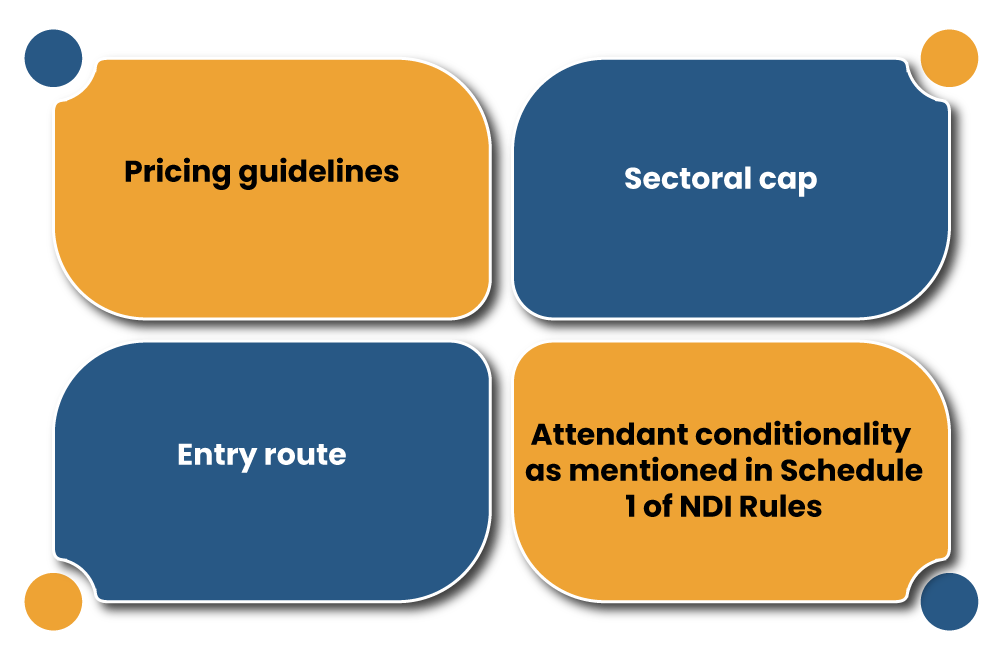India rejoices a vital presence in the worldwide pharmaceuticals sector with a 20% share of generic drugs in suppliers by volume. Indian pharma sector caters to over 50% of worldwide demand for various vaccines, 40% of generic demand in the United States & 25% of all drugs in the United Kingdom. Liberalization of trade and relaxed government policies has allowed this sector to obtain seamless funding from potential foreign clients. Foreign Exchange Management Act (FEMA) plays an important role in this regard. It acts as a legal framework that keeps a tap on foreign exchange activities. FEMA has also specified certain regulations for FDI meant for the Indian companies. In this blog, we would explore the FEMA Compliances for Pharmaceutical Sector.
An overview of the Pharmaceutical Sector in India
- Pharma sector is expected to secure a growth valuation of USD 100 Billion by the year 2025. The aggregate annual export turnover of all the companies in the pharma sector is accounted for 20 billion USD. T
- The sector also managed to secure the same valuation in terms of domestic annual turnover. Last year, the Indian government came up with a package worth Rs14,000 cr for the establishment of a bulk drug & medical devices park.
- For leveraging production capabilities of the sector, the government is trying to bring Production linked Incentive scheme for this sector.
- Indian Pharma Sector is likely to experience massive growth in the near future owing to the ever-increasing global demand for vaccines.
- Owing to the ever-improving footprint in the global market and cutting-edge production capabilities, this sector has managed to secure a significant quantum of foreign direct investment in the recent past.
- Apart from securing FDI, the sector has also made some effort to extend its footprint beyond the domestic market by leveraging Overseas Direct Investment (ODI).
Let’s go through some fundamental FEMA provisions on FDI and ODI relating to the Pharmaceuticals sector.
Amendment in the Pharmaceutical sector in India
- The Indian Pharma sector has lured a significant quantum of FDI from abroad, plus it has made considerable effort in terms of Overseas Direct Investment.
- In accordance with the amendment made via Finance Act 2015[1], the Indian government has been vested with rights to legislate for Capital Account Transactions.
- Department of Economic functioning under the Ministry of Finance has underpinned issued Foreign Exchange Management (Non-debt Instrument) Rules, 2019 (aka NDI rules) for securing Foreign Investment/Foreign Direct Investment in India.
- NDI Rules replaces Foreign Exchange Management (Transfer or Issue of Security by a Person Resident outside India) Regulations, 2017, known as TISPRO.
FDI in India encounters legalities on the grounds of the following parameters


Foreign Direct Investment in the Pharmaceuticals
As per Schedule 1 under NDI Rules, Government permits 100% FDI in the pharma sector both in terms of Greenfield and Brownfield investment. The entry route pertaining to the Greenfield investment is 100% under the automatic route. However, in the case of Brownfield investment, this quantum has been capped at 74% under the automatic route. Anything higher than that shall be subjected to applicable laws and regulations.
Key points to Ponder
- Greenfield and brownfield investments are two types of FDI.
- In Greenfield investing, the company builds its new facilities in their host country from scratch.
- In Brownfield investment, on the other hand, the company purchases or leases established facilities.
Conditions apply to the Brownfield & Greenfield investments
- Non-compete clause would be permitted only under specific scenarios with government approval.
- Certificate, in a pre-determined format, to be submitted by prospective investor and investee rendering thorough detail of agreements drafted and attaching the copies thereof.
Read our article:A Complete Briefing on Compounding of Offenses under FEMA
Conditions for the Brownfield investment
The government may, while rendering consent for Brownfield, impose suitable conditions for foreign direct investment in such cases.
- Maintenance of Production as well as supply of NLEM Drugs (National List of Essential Medicines): The production level of such medicines and their supply to the local market ought to be managed over the next five years at an absolute quantitative level. Benchmark for such level would be the highest level of annual Production for such drugs in the last three years, before the orientation of overseas investment.
- Maintenance pertaining to R&D expenditures: From a value standpoint, it must be maintained for five years at an absolute quantitative level. The benchmark in this context would be the highest level of Research and Development expenses that came to light on any of the last three financial years promptly preceding the year of Foreign investment
- In the event of technology transfer, entire information along with the orientation of overseas funding to be submitted to the Administrative Ministry.
- Department of Pharmaceuticals, Ministry of Health & Family Welfare, or any other regulators as notified by Central Government, shall administer the compliance of conditionalities.
FDI from below, regardless of sector, would need to avail government permission:
- Any establishment of the country which is in close proximity to the Indian Border or
- Beneficial owners belong to the nation which shares a land border with India.
Therefore, foreign Direct Investment from the entities of the neighbouring countries such as Pakistan, Nepal, Afghanistan, China, and Myanmar would be subject to government permission (NDI rules, 2020).
NDI rule entails schedules for overseas investment. Schedule 1 talk about the FDI. Each schedule renders distinctive legal treatment to the foreign investment as per the conditions and limits mentioned therein. Investment for foreign nationals, on a non-repatriation basis under schedule, shall receive legal treatment at par with Domestic Investment and henceforth not deemed as an overseas investment.
Equity Instruments to Person Resident outside India (PROI): It ought to be issued within sixty days from the date of consideration’s receipt, failing which consideration must be sent back to PROI within 15 days from the completion date of sixty days. Such transaction must be conducted via banking modes or by credit to his NRE/ FCNR (B) account.
Conditions relating to Pricing
Listed Company: Price outlined pursuant to the guidelines of SEBI.
Un-listed Company: In view of any globally-acknowledged pricing methodology for valuation on an arm’s length basis approved by the CA or a SEBI-certified Merchant Banker or a practising Cost Accountant.
Payment mode for equity instrument & the reporting norms is regulated by the Foreign Exchange Management (Mode of Payment and Reporting of Non-debt Instruments) Regulations 2019, underpinned by the Reserve Bank.
Conditions relating to Reporting
Form Foreign Currency – Gross Provisional Return (FC-GPR): An Indian-based organization granting equity instruments to PROI, under FDI must share such concern in form FC-GPR, within thirty days from the issuance date of the equity instruments.
Annual Return on Foreign Liabilities and Assets (FLA): An Indian-based organization, which has received overseas funding or an LLP which has secured Foreign Investment, shall furnish form, viz FLA to reserve bank by 15th duly of each year.
Foreign Currency – Transfer of Shares (FC-TRS): to be filed for equity instruments’ transfer in pursuant to NDI rules, between:
- PROI having equity instruments in an Indian-based entity on a repatriable basis or otherwise.
- PROI having equity instruments in an Indian-based entity on a repatriable basis & PRI accountability is on resident transferor/transferee, or PROI have
- PROI holding equity instruments in an Indian company on a repatriable basis and PROI holding equity instruments on a non-repatriable basis; and
- PROI holding equity instruments in an Indian company on a repatriable basis and PRI equity instruments on a non-repatriable basis. Transfers of Equity Instrument of an Indian-based entity by/to PROI are regulated by Rule 9 &13 of NDI Rules.
Form LLP (I): Entity functioning as an LLP getting amount towards the acquisition of profit shares/ capital contribution from PROI, must file Form LLP (I), within 30 days period from the receipt of consideration.
Form LLP (II): On transfer of capital contribution/disinvestment//profit share between PRI & PROI from Form LLP (III) ought to be filed within 60 days from the receipt of funds. The obligation of reporting is on the resident transferee/ transferor
Conclusion
Government allows 100% Foreign Direct investment in the pharma sector via Brownfield and Greenfield investment. The entry route for Greenfield-based funding is 100% under the automatic route. Meanwhile, for Brownfield investment, this quantum is 74% under the automatic route. The applicable laws and regulations will come into play if the amount of investment surpassed such a limit.
Read our article:FEMA Compliance Checklist for Startups from FDI standpoint











